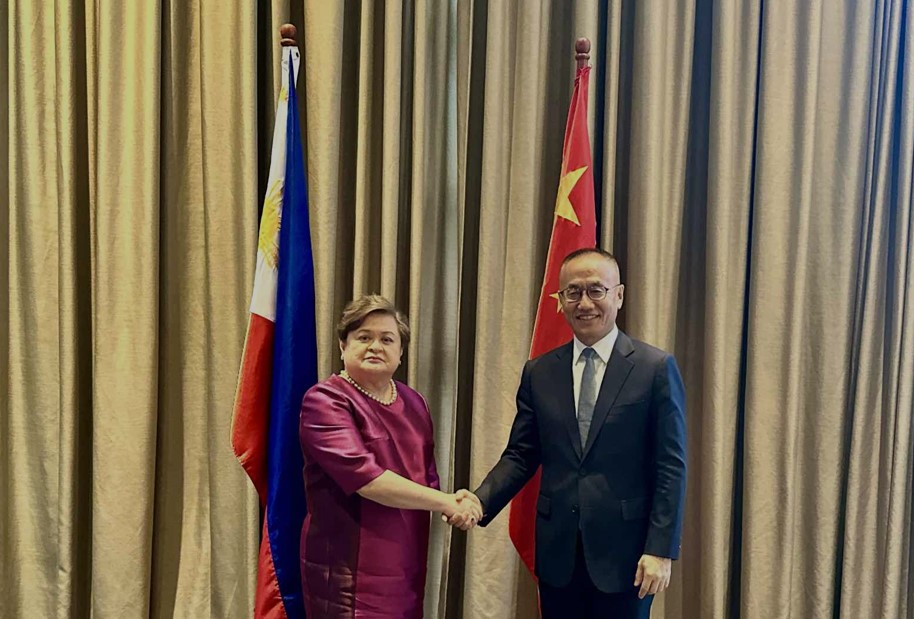
The Philippines and China sought Tuesday to de-escalate and manage disputes in the West Philippine Sea amid the spike of violent confrontations between the two sides, the Department of Foreign Affairs (DFA) said.
In a statement, the DFA said a bilateral meeting was held in Manila—the second for this year since January 17—where the two countries discussed the situation in the disputed waters, including the June 17 incident where Chinese Coast Guard vessels rammed Philippine vessels, seized firearms and rubber boats, and threatened Filipino soldiers with knives, axe and spears to stop them from delivering food supplies, firearms and other necessities to Filipino troops at the Second Thomas Shoal.
It was the most violent Chinese action against the Philippines, which triggered condemnation and alarm from several countries led by its treaty ally, the United States.
Philippine Foreign Affairs Undersecretary Ma. Theresa Lazaro and Chinese Vice Foreign Minister Chen Xiaodong "had frank and constructive discussions on the situation in the South China Sea," the DFA said.
"Noting recent incidents in the South China Sea, both sides recognized that there is a need to restore trust, rebuild confidence, and create conditions conducive to productive dialogue and interaction," the department said.
"The two sides discussed their respective positions on Ayungin Shoal and affirmed their commitment to de-escalate tensions without prejudice to their respective positions," it added.
While there was "substantial progress on developing measures to manage the situation at sea," the DFA said "significant differences remain."
However, both sides agreed to continue discussions "to find a mutually-acceptable resolution to the issues."
Videos and photos released by the Philippine military showed tense confrontation at the shoal, where a grounded World War II-era vessel, the BRP Sierra Madre, serves as a Philippine military outpost.
Several Philippine Navy personnel were injured in China's attacks on June 17, including one who lost his right thumb. Chinese Coast Guard also slashed the Philippines' Rigid Hull Inflatable Boats (RHIB) and smashed its navigational screens.
President Ferdinand Marcos Jr. and other officials protested the Chinese assault, calling it "deliberate and illegal."
Washington has warned that it has a treaty obligation to defend the Philippines from hostile armed attacks.
The Philippines largely won a landmark case against China’s massive claim in the South China Sea before an arbitration tribunal in The Hague, Netherlands, but Beijing does not recognize the ruling.
During the meeting, Lazaro, according to the DFA, told her counterpart that the Philippines "will be relentless in protecting its interests and upholding its sovereignty, sovereign rights, and jurisdiction in the West Philippine Sea" - Manila's name for parts of the South China Sea that falls within its jurisdiction.
To prevent miscommunication and confrontation at sea, the DFA said the two sides signed an Arrangement on Improving Philippines-China Maritime Communication Mechanisms and agreed to discuss further how to operationalize this mechanism.
They also agreed to continue discussions on the possible resumption of the Joint Coast Guard Committee (JCGC) between the Philippines and China and proposed to hold an academic forum among Filipino and Chinese scientists and academics on marine scientific and technological cooperation.
"Both sides agreed that continued dialogue on the basis of mutual respect as two equal sovereign states facilitates peace and stability at sea, and committed to having the 10th BCM in China to sustain the positive momentum on discussions," the DFA said.
A vital trading and shipping lane, the South China Sea, dotted with rocks, shoals and reefs where rich oil and mineral deposits were found, are claimed in part or in whole by the Philippines, China, Vietnam, Malaysia, Brunei, and Taiwan.— VDV/RF, GMA Integrated News




